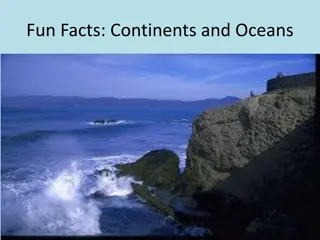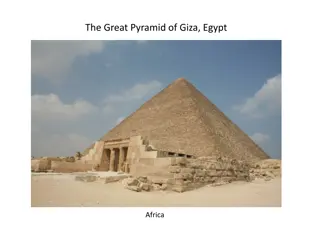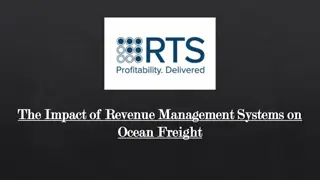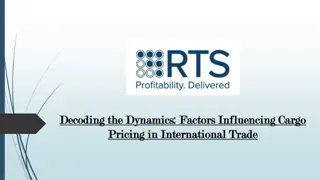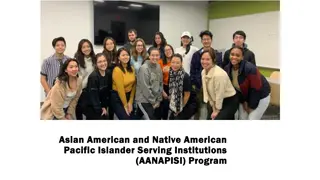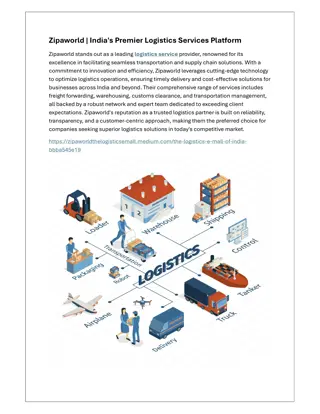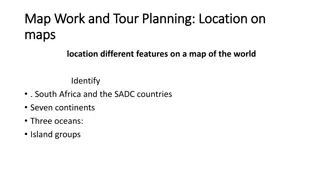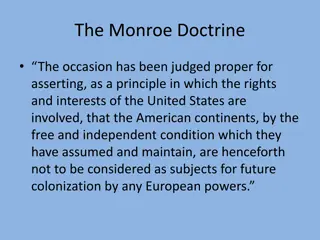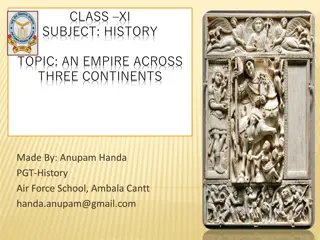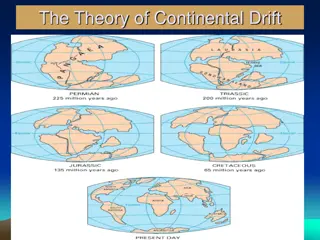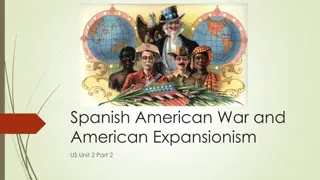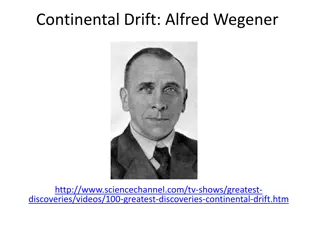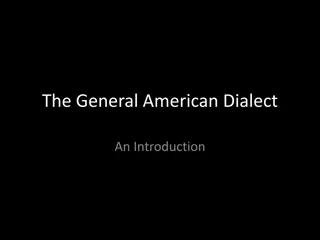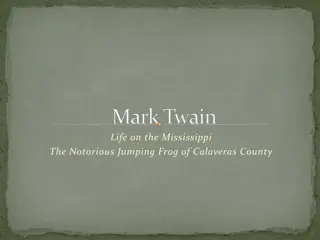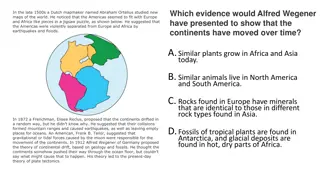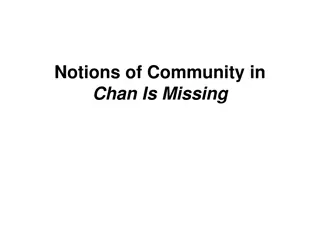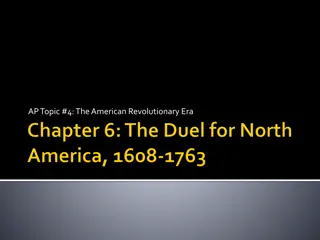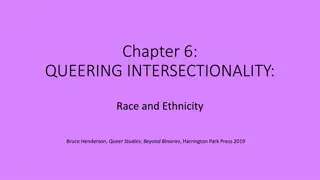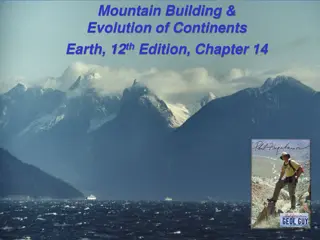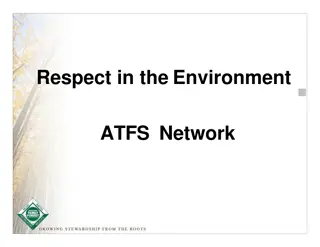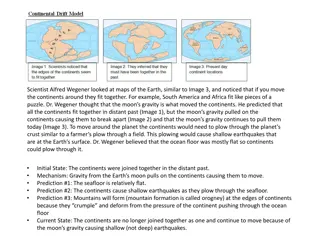Liberty & The Age of Enlightenment The American Battlefield Trust
The Age of Enlightenment, with its emphasis on natural law, liberty, progress, and constitutional government, greatly influenced American thinking and the Revolutionary War. Key figures like John Locke and Sir William Blackstone contributed ideas of social contract and law that shaped American gover
2 views • 15 slides
Fascinating Facts About Continents and Oceans
Explore intriguing facts about the continents and oceans of our planet; from the five main oceans to unique features of Antarctica and Africa. Discover the deepest point in the Pacific Ocean and interesting details about the Sahara Desert. Immerse yourself in the wonders of Earth's geography!
5 views • 10 slides
Zora Neale Hurston: African-American Writer of the Harlem Renaissance
Zora Neale Hurston, born in Notasulga, Alabama, in 1891, was a prominent African-American writer known for her works reflecting the African-American culture and folklore. Growing up in Eatonville, Florida, and later studying at Barnard College, she stood out among her contemporaries for her portraya
2 views • 4 slides
Fascinating Architectural Marvels Around the World
Explore iconic architectural wonders like the Great Pyramid of Giza, the Leaning Tower of Pisa, the Burj Khalifa, the Chrysler Building, and Titanium La Portada. Learn about their history, unique features, and impressive designs, showcasing the beauty and ingenuity of human construction across diffe
3 views • 10 slides
Dissemination of CBS in Low- and Middle-Income Countries
This research project explores the obstacles, successful strategies, and perspectives related to disseminating Contextual Behavioral Science (CBS) in 11 countries across different continents. The study involves conducting interviews with psychologists who disseminate CBS, analyzing the data using th
7 views • 19 slides
The Impact of Revenue Management Systems on Ocean Freight
In today's rapidly evolving global marketplace, the ocean freight industry stands as a critical component of international trade, underpinning economic activities across continents. Managing the complexities of shipping logistics and pricing strategies efficiently is no small feat. This is where adv
6 views • 6 slides
Factors Influencing Cargo Pricing in International Trade
In the intricate web of global commerce, where goods traverse continents and oceans, the pricing of cargo plays a pivotal role. From determining profitability to influencing market competitiveness, cargo pricing in international trade is a multifaceted domain shaped by various factors. Revenue techn
3 views • 6 slides
Overview of AANAPISI Program in the United States
The Asian American and Native American Pacific Islander Serving Institutions (AANAPISI) Program aims to support institutions with a minimum of 10% Asian American and Native American Pacific Islander undergraduate enrollment. Currently, there are 54 funded AANAPISI institutions across 16 states and t
0 views • 13 slides
If you are looking for Spicy Food in First Hill
If you are looking for Spicy Food in First Hill, Haidilao Hot Pot Seattle is the largest direct-operated hot pot brand in China and a globally renowned Chinese restaurant chain, with a total of over 1 billion customer visits. Since 2019, Haidilao has been ranked among the world's leading restaurant
0 views • 6 slides
The Essential Role Played by Ocean Freight Forwarders in Global Supply Chain Log
Ocean freight forwarders play a pivotal role in the global supply chain by orchestrating the movement of goods across vast oceans and continents. Acting as intermediaries between exporters and importers, they manage the intricacies of international shipping logistics with precision and expertise. Th
1 views • 1 slides
Map Work, Tour Planning, and Geographical Features Worldwide
Discover the location of South Africa, the SADC countries, continents, oceans, and island groups on a world map. Learn about the Southern African Development Community (SADC) and the seven continents. Understand the tourism regions and island groups found in various parts of the world. Enhance your
0 views • 9 slides
The Columbian Exchange - Transfer of Goods, Ideas, and Diseases between Hemispheres
The Columbian Exchange was a significant transfer of animals, plants, culture, technology, and diseases between the American and Afro-Eurasian hemispheres in the 15th and 16th centuries. This exchange shaped the course of history, impacting populations on both continents through the introduction of
0 views • 10 slides
Evolution of American English Vocabulary and Language Features
American English exhibits arachaic features and early changes in vocabulary due to colonial influences and the distinct political and administrative system. The language has preserved old-fashioned elements from the seventeenth and eighteenth centuries, while also incorporating new words inspired by
0 views • 5 slides
The Monroe Doctrine: A Declaration of American Independence
The Monroe Doctrine asserts that the American continents are not to be colonized by European powers and considers attempts to extend European systems into the hemisphere as dangerous. The United States declares its non-interference with existing European colonies or dependencies.
0 views • 8 slides
An Empire Across Three Continents - A Historical Journey
Explore the fascinating history of an empire spanning three continents, from the rise of trade networks in the Assyrian empire to Alexander the Great's conquests and the evolution of Rome into a dominant power. Discover the shared cultures, languages, and sources that illuminate the rich past of the
1 views • 34 slides
The Theory of Continental Drift and Wegener's Evidence Explained
The Theory of Continental Drift proposes that continents were once part of a single landmass known as Pangaea, which eventually broke apart and drifted to their current positions. Alfred Wegener provided evidence supporting this theory, including the fit of continents like puzzle pieces, fossil simi
0 views • 27 slides
Spanish-American War and American Expansionism: A Look Back in History
Explore the causes and impacts of the Spanish-American War, including the influence of Yellow Journalism, nationalism, and imperialism on American expansionism during the late 1800s. Learn about key figures like Theodore Roosevelt and the Rough Riders, and the significance of policies like the Monro
0 views • 25 slides
Cultural Awareness for Drug Courts Working with Native American Participants
Understanding the cultural nuances of Native American communities is crucial for Drug Courts collaborating with Tribal Healing to Wellness Courts. This involves acknowledging tribal sovereignty, regional and cultural differences, customs, spirituality, and communication styles unique to American Ind
0 views • 22 slides
Native American Repatriation and NAGPRA Overview
The Native American Graves Protection and Repatriation Act (NAGPRA) enacted since November 1990 establishes ownership of cultural items excavated on Federal or Tribal land. It requires returning such items to Native American descendants and affiliated tribes. The Act also criminalizes trafficking in
1 views • 8 slides
American Revolutionary Era: Key Events and Figures
The American Revolutionary Era marked by the formation of the Constitution, Washington's militia, key figures like Jonathan Trumbull and John Peter Muhlenberg, the emergence of American culture, the Articles of Confederation, and calls for a stronger government. This period saw a shift towards a mor
0 views • 17 slides
Native American Beliefs and Spiritual Practices
Delve into the rich tapestry of Native American beliefs, traditions, and spiritual practices, including their diverse worldviews, sacred connections to nature, and unique cultural expressions. Discover the origins of terms like "Indian" and the vast linguistic diversity among different Nations. Cont
3 views • 13 slides
Washington Irving: Father of American Fiction and Pioneer of American Romanticism
Washington Irving, an influential American author of the early 19th century, is revered as the Father of American fiction. Known for iconic works like "The Legend of Sleepy Hollow" and "Rip Van Winkle," Irving played a crucial role in establishing American literature as an independent art form. His
1 views • 14 slides
The Theory of Continental Drift: Alfred Wegener and Pangaea
Alfred Wegener proposed the theory of continental drift, suggesting that the continents were once part of a single landmass called Pangaea. Evidence such as fossils and rock formations on different continents supports this theory. The concept of plate tectonics further explains the movement of conti
0 views • 6 slides
The Fascinating Theory of Continental Drift Explored
In the early 1900s, Alfred Wegener introduced the groundbreaking hypothesis of continental drift, suggesting that the continents were once part of a single landmass before drifting apart to their current locations. This theory is supported by evidence such as the alignment of continents, shared foss
0 views • 25 slides
Overview of the General American Dialect
The General American Dialect, also known as GenAm, is a widely preferred dialect of English characterized by minor differences in pronunciation compared to regional American accents. It is distinct from Southern, Midwestern, and Northeastern accents and is one of the two global English dialects alon
0 views • 13 slides
Mark Twain's Humorous Tales and Regionalism in American Literature
Mark Twain, a master of humor and regionalism, depicted American culture in a distinctive way through his works such as "The Notorious Jumping Frog of Calaveras County" and "Life on the Mississippi." His stories showcase exaggerated characters, humorous situations, and unique dialects, reflecting th
0 views • 8 slides
American History Curriculum for Grade 11 - Semester 1
This American history curriculum for Grade 11 Semester 1 covers key topics such as the Declaration of Independence, American Revolution, industrialization, urbanization, immigration, imperialism, and the United States' emergence as a world power. Students will examine diverse aspects of American his
0 views • 11 slides
Earth's Structure and Continental Drift Theories
Dutch mapmaker Abraham Ortelius noted the jigsaw fit of continents, leading to the theory of continental drift. Alfred Wegener proposed the movement of continents based on geological evidence, influencing plate tectonics theory. Earth's layers vary from the thick mantle to the solid inner core due t
0 views • 27 slides
Unit Assessment Review: U.S. Imperialism History Lesson
Review session for upcoming history unit assessment on U.S. Imperialism. Topics covered include key events such as the Philippines under American control, reasons for Mark Twain's anti-Imperialist stance, factors driving American foreign policy towards imperialism, the case of Hawaii's Queen Liliuok
0 views • 15 slides
The Theory of Plate Tectonics: Continents in Motion
Earth's crust and lithosphere have changed over geologic time, forming tectonic plates that move due to convection currents. The concept of plate tectonics explains how continents fit together, the existence of a supercontinent called Pangaea, and natural phenomena like earthquakes and mountains. Ea
0 views • 28 slides
Asian American Identity Through "Chan Is Missing" by Wayne Wang
Chan Is Missing" (1982) directed by Wayne Wang is a groundbreaking Asian American independent feature film that delves into themes of Asian American identity, hyphenated identity, assimilation, and hybridity. The film, shot on a shoestring budget in San Francisco's Chinatown, showcases the community
0 views • 26 slides
The American Revolutionary Era Overview
The American Revolutionary Era marked a period of intense rivalry between France, England, and Spain for control of North America, leading to conflicts like the French & Indian War. Key events such as the founding of Quebec, exploration by Robert de La Salle, and establishment of New Orleans shaped
0 views • 39 slides
Influence of American Culture on American Christianity: A Critical Analysis
This content explores the relationship between American culture and American Christianity, discussing how religion reflects the cultural values of individualism, optimism, and the concept of a blessed nation. It delves into the concept of Biblical individualism, the influence of prosperity gospel, a
1 views • 7 slides
Queer Identities in Native American and African-American Communities
Delve into the nuanced intersections of race, ethnicity, and queerness within Native American and African-American communities. From the reclaiming of Two-Spirit identities to the presence of queer writers in literary spaces, this exploration sheds light on the complexities of identity, resistance t
0 views • 38 slides
Mountain Building and Evolution of Continents
Mountain building, orogeny, and the formation of major mountain belts are key processes in the evolution of continents. This chapter delves into the geological mechanisms behind these phenomena, focusing on convergent boundaries, the American Cordillera, Alpine-Himalaya chain, and other significant
0 views • 50 slides
The War of 1812: Causes, Events, and Effects
The War of 1812 was influenced by issues such as British impressment of American sailors, arming Native Americans, and trade restrictions. Despite opposition, President James Madison declared war in 1812. The conflict marked a period of American nationalism, with War Hawks pushing for war and Doves
1 views • 16 slides
Promoting Respectful and Safe Environments in the American Forest Foundation
This content highlights the importance of maintaining a respectful and safe environment, particularly within the American Forest Foundation and the American Tree Farm System. It emphasizes understanding and appreciating the distinguishing characteristics of individuals, recognizing and addressing ha
0 views • 35 slides
American Literature Through the Ages
Explore the rich tapestry of American literature covering American Indian culture, New England Puritanism, the 18th century American Enlightenment, and the American Renaissance. Discover the oral traditions of American Indian tribes, the puritanical values of New England, the democratic origins of A
0 views • 17 slides
The Theory of Continental Drift and Plate Tectonics
Scientist Alfred Wegener proposed the theory of continental drift, noticing how continents could fit together like pieces of a puzzle. His idea evolved into the concept of plate tectonics, explaining the movement of Earth's lithosphere. This model highlights the dynamic nature of the Earth's surface
0 views • 4 slides
Cardio-metabolic Abnormalities Among Normal Weight Individuals: A Cross-sectional Analysis of Race/Ethnicity in the U.S.
Overweight and obesity are known cardio-metabolic risk factors, but this study delves into abnormalities among normal-weight individuals. The research compares data from MESA and MASALA studies, including diverse race/ethnicity groups like White, African American, Hispanic American, Chinese American
1 views • 23 slides

